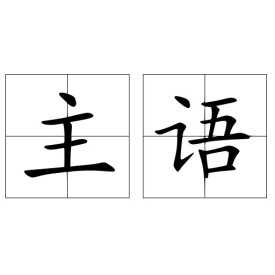主語
主語
主語,是執行句子的行為或動作的主體,如“我寫字”中的“我”,就是主語,它做出“寫”這個動作。“寫”則是謂語,用來修飾主語,而“字”是接受謂語“寫”這個動作的對象,它因此被稱為賓語,有的語法書也稱它為“客體”或“受體”。主語是 句子中的陳述對象,與 英語語法也有相似之處。常常由名詞、代詞、或 名詞性短語充當。形容詞、動詞、謂語性短語和 主謂短語也可充當主語。句子成分劃分時,主語符號為雙橫線。
主語是句子中的陳述對象,與英語語法也有相似之處。常常由名詞、代詞、或名詞性短語充當。形容詞、動詞、謂語性短語和主謂短語也可充當主語。句子成分劃分時,主語符號為雙橫線。
● ● 冰雪融化了,草兒綠了,春天來了。 (冰雪、草兒、春天,名詞作主語)
● ● 一米等於一百厘米。 (一米,數詞做主語)
● ● 他們終於登上了山峰。 (他們,代詞作主語)
● ● 每個人的學習方法都不同。 (學習方法,名詞性短語作主語)
● ● 和平與發展是當今世界的兩大主題。 (和平與發展,並列短語作主語)
● ● 吃的是草,擠出來的是奶。 (吃的、擠出來的,動詞性短語作主語)
● ● 學開車是很不容易。 (學開車,動賓短語作主語)
● ● 人多了很危險。 (人多了,主謂短語做主語)
● ● 優美的音樂令人陶醉。 (音樂,作主語)
● ● 施事主語:主語在句子中是動作行為的發出者。例如:大家要積極參加學校活動。(“大家”是主語)
● ● 受事主語:主語在句中是動作行為的承受者。例如:校報還沒有印出來。(“校報”是主語)
● ● 中性主語(當事主語):主語在句子中既不是施事,也不是受事,而是被描寫、說明、判斷的對象。又 叫“關係主語”。例如:我們的前程很美好。(“前程”是主語,是被描寫的對象)小明十六歲了。(“小明”是主語,是被說明的對象)北京是祖國的心臟。(“北京”是主語,是被判斷的對象)
漢語的主語和印歐語有很大不同。因為漢語缺乏形式標記,所以不同詞性的詞與句子成分之間的對應關係錯綜複雜。這類問題歷來有爭議,可以理解為詞的兼類,也可以理解為詞和句子成分對應關係問題。
按照語言學家朱德熙的說法,主語位置上的動詞、形容詞被解釋為名詞化的實際上很牽強,是照搬印歐語法的結果,動詞、形容詞實際上也可以做主語。
例如:
逃避不能解決問題。(逃避是動詞)
堅強是一種寶貴的品質。(堅強是形容詞)
作主語的詞:名詞,代詞,名詞化了的動詞,形容詞,分詞,副詞或數詞等,動詞不定式或不定式短語,從句,某些固定片語。
例:The villagers didn't realize how serious the pollution was until the fish in the river died.
直到河裡的魚死了,村民們才意識到污染的嚴重性
S(subject主語)+ V(verb謂語動詞) +O(object賓語). 主系表結構 :S(subject主語)+V(verb謂語動詞,也稱為系動詞,就是所說的“系”)
倒裝:Not until the fish in the river died did the villagers realize how serious the pollution was.
注意:倒裝在主句,從句不倒裝 /did 和not 提前,只剩動詞原形
強調:It was not until the fish died in the river that the villagers realized how serious the pollution was.
如果強調的是主語或賓語且指人用who,其他一律用that。是that,而非其他/主句的順序(倒裝不強調,強調就不倒裝)
人稱代詞(主格),名詞性代詞,指示代詞,不定代詞,such(----樣的人、物),it(時間,天氣,距離等)
at midnight /in the(泛指)middle of the night
例:It is 9 o'clock when I went home.
我回家的時候已經九點了
一般句:It was nine when I got home.
強調句:It was at nine that I got home.
原形:I got home at nine.
注意:作主語在句首/it作主語構成(常用 v-ing,不常用只有 use,good)
(1)It is +adj. +of sb.(人的屬性)/for sb.(物的屬性)to do
例:It is necessary to finish the design before National day. Tomorrow is National day.
有必要在國慶節之前完成設計。明天是國慶日
(2)it is +n.+for/of sb. to do
例:It is not good manners for Arabs to stand close talking to their friends.
對阿拉伯人來說,和他們的朋友說話離得近不是一個好習慣
It is a great honor for us to be invited to the party.
被邀請參加聚會是我們極大的榮幸
在感嘆句中必須用it作形式主語:What a joy/ pleasure (it is) to read the book.
在問句中必須用形式主語:Is it possible to go to the moon by spaceship?:可以乘宇宙飛船去月球嗎?
Ten out of 100 Americans are over /above /more than 65.
一般 / 完成時
v-ing: 主動/doing/having done
not doing:被動/being done/having been done
注意:doing 無時間限定/與謂語同時出現/在謂語動詞后發生having done發生在謂語之前
He still remembers being prized.
當邏輯主語為無生命的東西時
1.作主語時,通常表示一般性的無時間性的東西。而不定式表示某一種具體的動作。
Smoking is habit difficult to break:抽煙的習慣很難打破的
2.主語和表語一致
Seeing is believing:眼見為實
3.邏輯主語必須是所有格形式
The old man's taking pity on the snake leads to his death.那個老人憐憫那條蛇,導致他的死亡。
4.“it”作形式主語:當表語為 no use,no good,no harm,any good,fun等名詞或useless,nice,good,interesting,worthwhile等形容詞時,句首常用it作形式主語,動名詞後置。句型常用於說明“某種活動或某件事情如何”
To +動詞原形
Not to do 解釋:具有動詞的性質,作賓語,狀語/具有名詞的性質,作主語/具有形容詞性質,作定語/具有副詞的性質,作狀語。除謂語不可作之外,其他都可。
• 一般式:to do
• 進行時:to be doing
• 完成時:to have done
• 完成進行時:to have been doing
to do:表示動作發生在謂語之後,I want to go home.與謂語動詞幾乎同時發生
to be doing :表示與謂語動詞同時發生
to have done:發生在謂語動詞之前 Someone was considered to have done something.
to have been doing :動作從過去開始一直持續到謂語動詞這個動作的發生
不定式表示一種確定的動作
To do morning exercises this morning is not good for your health:今天早上去做早操對你的健康不好
名詞化的形容詞:the poor /the sick
名詞化的過去分詞:the disabled
名詞化的介詞短語:From my home to school is three kilometers:從我家到學校有三公里
副詞----不定式或動名詞
What an excitement to find a shark when you’re swimming in the sea.
當你在大海中游泳時,發現鯊魚是多麼興奮的事
〔1)that引導的從句,無意義,不擔當句子成分,不省略
a. It +v+ that從句
b. It +系動詞+表語+that從句
c. It is strange that he didn't come here yesterday:奇怪的是,昨天他沒來這裡
當形容詞為important necessary strange /that should +動詞原形
It is strange that he should (表示吃驚)pass the exam:奇怪的是,他可以通過考試
〔2)It is +n +that 從句
What a pity it is that you didn't come to this party:真遺憾你沒來這個聚會
當名詞為a pity/a shame /a surprise +should +v原形(表示竟然)
What a pity that she should be fail in exam:真遺憾,她竟然考試不及格
〔3) It is +過去分詞+that 從句
It is reported that a car accident happened there:據報道,發生一場車禍
從句s +be v-ed + inf.
He is said to be studying in the USA:據說他在美國學習
有人建議suggest/order/request + 從句 should +動詞原形
〔4) It +動詞原形seem/appear /turn out/+that
It seems that it will rain:看來要下雨
〔1 〕It strikes sb. that從句:表示“某人突然想…”
It occurs to sb. that從句:表示“某人發生了…”
〔2〕 為強調從句意義,that從句常放在句首
例:That he will come here is of great help:他來這兒是很有幫助的
That you failed the exam will…:你考試失敗了會…
--What made his father so angry? :什麼使他父親很生氣?
--That he failed the exam. 或He fails the exam:他考試不及格
c.在問句中必須有形式主語
It is true that Bush will visit China again?
Whether /if是否不擔當句子成分,也不省略
A.句首隻用whether
Whether he will come to the meeting is unknown yet.
B.句末形式主語都可用 It ----whether/if
It is of no/little important whether/if it will rain today.
c.在有些句型中,從句不在前 It doesn't matter whether ----
It doesn't matter whether it is new/it will rain tomorrow.
〔3) 連接代詞 who /whom/whose/what/which/擔當從句成分,有意義,不省略
A. what +sb. + clause
What we will do next is not decided.
B. what+修飾詞 意為什麼樣的……
What color you like is none of my business.
C. what ……人,……事,……物
What he said at the meeting surprised everyone present.
注意:what前是否有先行詞/與that 之間的區別
That he said it at the meeting surprised everyone present.
What 與which 的區別
Which/what you want---若給定範圍用which,沒有用what。
What ---be that---強調句的一種(強調後者):
What I need most is that someone helps me.
另外,what引導的從句作主語時,大多數情況下視為第三人稱單數:
What we need is time.
What you said yesterday is right.
但也有例外,如What we need are good doctors.
注意:當what引導的名詞性從句作主語時,主謂一致問題極為複雜。著名學者周海中教授在論文《關於what-分句作主語的主謂一致問題》中就這一問題做了深入研究,並給出了10種的主謂一致關係。這些一致關係值得英語學習者和使用者特別注意。
There be +what clause
There was we call People's Republic of China in Chinese history.
What +比較級what more /what worse
what引導從句作狀語修飾全句的內容。在句首或句中,很少在句尾
Which +n (single)
Whose +n(只用此)
Whose father is a doctor is no sense.
It從句作形式主語(what……人或物時,不用it)
〔4)連接副詞when/whose/how/why擔當句子成分,有意義,不省略
How the accident happened puzzled everyone.句尾用形式主語it
〔5) 引導主語從句
whoever/whosever/whatever/whichever/Anywhere/anything that /everyone that/whoever=anyone whom/anything that (泛指)/anything what (特指)
Whoever 指人從意義判斷
Who 引導指事
Since the introduction of reform, China has made earth shaking changes.自從改革以來,中國發生了翻天覆地的變化。
Das Auto ist repariert. (名詞)
汽車修好了。
Er ist ein Lehrer. (代詞)
他是教師。
Das Ein- und Ausschalten dieses Instrument ist automatisch. (動名詞)
這個儀器的開和關是自動的。
Das Alte ist noch sehr gesund. (形容詞)
這位老人還很健康。
Die Reisenden sind schon seit Stunden muede. (第一分詞)
旅途上的人已在幾小時前就累了。
Heute ist vieles anderes als frueher. (副詞)
現在跟以前已有很多的不同。
Die Tausend ist ein vierstellige Zahl. (數詞)
千是個四位的數字。
Trinken ist in der Arbeit verboten. (第一不定式)
工作時間不準喝酒。
Mit dir zusammen zu arbeiten ist kein Spass. (不定式短語)
跟你一起工作沒一點兒意思。
Es ist nicht einfach, den Wettbewerb zu gewinnen . (不定式短語/形式主語es)
贏得競賽並不簡單。
Dass meine Freundin zu mir kommt , freut mir sehr. (從句)
我女友的到來,令我非常高興。
Unseres Bleibens ist hier nicht laenger. (固定片語第二格)
我們不在這兒停留多長。
